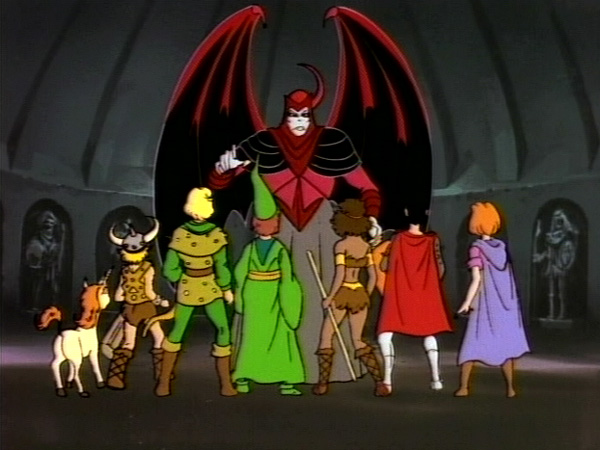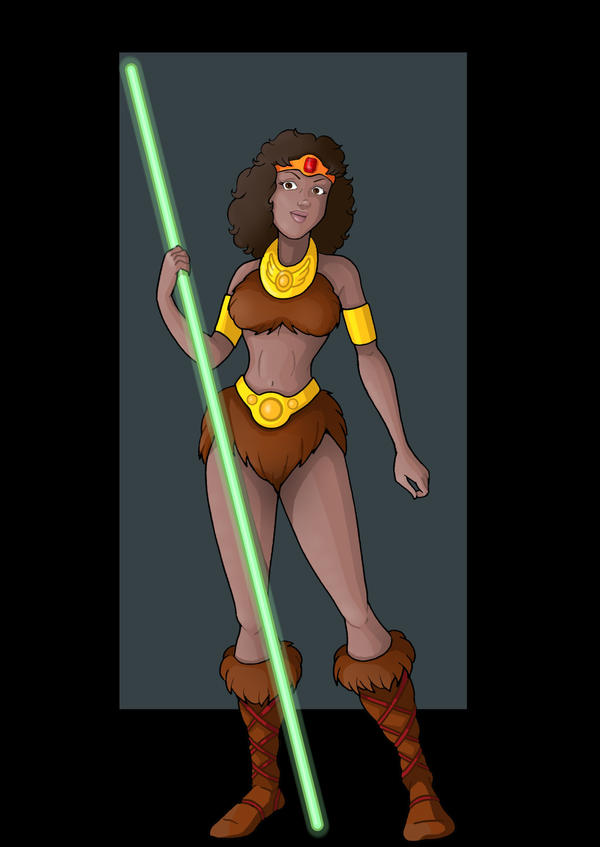There's been plenty of talk about the future of movies inspired by tabletop games, but the end of 2017 brought a surprise: a movie about a game that doesn't exist. Although it uses video game tropes, Jumanji: Welcome to the Jungle has a lot to say about role-playing games. If you haven't seen the movie, this discussion contains SPOILERS.
[h=3]"Many Effects"[/h]The concept behind Jumanji was established in a children's book by Chris Van Allsburg: kids play a board game and the game's effects seep into real life. Jumanji was a jungle-themed game where the players would face increasingly hostile animals and characters.
The book was the inspiration for the movie of the same name, starring Robin Williams as Alan Parrish, a boy trapped in the game for over 26 years before Judy and Peter Shepherd unwittingly release him. Like the book, it featured animals and a big game hunter named Van Pelt. Williams mentioned that the name of the game was actually the Zulu word for "many effects," but that's more speculation than fact (some supposedly Zulu speakers have contradicted this claim).
The most recent film, Jumanji: Welcome to the Jungle, is less a sequel and more a reimagining, with a character similar to Parrish trapped in the game, Alex Vreeke. Before he is sucked into the game, Vreeke rejects it with a sneer, saying, "who plays board games anymore?" In a sign of the changing times, Jumanji refashions itself as a video game -- but despite its video game roots, this new version of Jumanji is a lot like a role-playing game.
[h=3]Welcome to the Jungle[/h]The protagonists are four archetypes established by The Breakfast Club: the brain (Alex Wolff as Spencer Gilpin), the athlete (Ser'Darius Blain as Anthony "Fridge" Johnson), the basket case (Morgan Turner as Martha Kaply), and the social media-obsessed princess (Madison Iseman as Bethany Walker). They're in detention for a variety of reasons, which turns into an exercise in recycling magazines by removing staples. It also just happens to have the video game version of Jumanji, which of course our four hapless teens decide to play. That's when the fun really starts.
Jumanji: Welcome to the Jungle is as much a deconstruction of poor game design as it is a takedown of high school tropes. Spencer's avatar is Dr. Smolder Bravestone the archaeologist (Dawyne Johnson, intentionally playing against type as Spencer's nebbish germaphobe). Fridge picks Franklin "Mouse" Finbar the zoologist (Kevin Hart), because he misread his name as "Moose." Mouse is slow, weak, and vulnerable to cake, but he carries the backpack for our hero -- an inverse of Fridge and Spencer's relationship, in which Spencer does Fridge's homework for him. Martha ends up as Ruby Roundhouse (Karen Gillan), a redheaded "dance fighter" who wears skimpy outfits. Most hilarious of all is poor Bethany, who is transposed into the "curvy genius," Professor "Shelly" Oberon (Jack Black).
Jumanji goes beyond mocking video games into what it means to role-play someone else who is radically different from you. Each character has three lives, which means that the players take more risks early on and become more cautious as the game progresses. At heart Jumanji wrestles with what Live-Action Role-Players (LARPers) call "bleed".
[h=3]Bleeding Out[/h]LARP scholar Sarah Lynne Bowman explains what bleed is in the context of role-playing:
Bowman classifies bleed in two forms: bleed-in, in which feelings of the player affect the character; and bleed-out in which events in the game affect the player. Bleed-in is the source of much humor in Jumanji, where the strong are now the weak, the weak now the strong, and females are now males. The players discover that they must rely on other strengths than the archetypes associated with them (strong, attractive, smart). In doing so, the characters help their players grow emotionally: Spencer learns to be brave, Fridge learns to be a team player, Martha becomes more confident and Bethany learns to sacrifice for others.
Although Jumanji is nominally about video games, it emphasizes teamwork as necessary to survival. Co-creator of D&D, Gary Gygax, would agree:
In Jumanji, the only way the players can succeed is by working together. It's a lesson we can only hope the upcoming D&D film will feature prominently.
Mike "Talien" Tresca is a freelance game columnist, author, communicator, and a participant in the Amazon Services LLC Associates Program, an affiliate advertising program designed to provide a means for sites to earn advertising fees by advertising and linking to http://amazon.com. You can follow him at Patreon.
[h=3]"Many Effects"[/h]The concept behind Jumanji was established in a children's book by Chris Van Allsburg: kids play a board game and the game's effects seep into real life. Jumanji was a jungle-themed game where the players would face increasingly hostile animals and characters.
The book was the inspiration for the movie of the same name, starring Robin Williams as Alan Parrish, a boy trapped in the game for over 26 years before Judy and Peter Shepherd unwittingly release him. Like the book, it featured animals and a big game hunter named Van Pelt. Williams mentioned that the name of the game was actually the Zulu word for "many effects," but that's more speculation than fact (some supposedly Zulu speakers have contradicted this claim).
The most recent film, Jumanji: Welcome to the Jungle, is less a sequel and more a reimagining, with a character similar to Parrish trapped in the game, Alex Vreeke. Before he is sucked into the game, Vreeke rejects it with a sneer, saying, "who plays board games anymore?" In a sign of the changing times, Jumanji refashions itself as a video game -- but despite its video game roots, this new version of Jumanji is a lot like a role-playing game.
[h=3]Welcome to the Jungle[/h]The protagonists are four archetypes established by The Breakfast Club: the brain (Alex Wolff as Spencer Gilpin), the athlete (Ser'Darius Blain as Anthony "Fridge" Johnson), the basket case (Morgan Turner as Martha Kaply), and the social media-obsessed princess (Madison Iseman as Bethany Walker). They're in detention for a variety of reasons, which turns into an exercise in recycling magazines by removing staples. It also just happens to have the video game version of Jumanji, which of course our four hapless teens decide to play. That's when the fun really starts.
Jumanji: Welcome to the Jungle is as much a deconstruction of poor game design as it is a takedown of high school tropes. Spencer's avatar is Dr. Smolder Bravestone the archaeologist (Dawyne Johnson, intentionally playing against type as Spencer's nebbish germaphobe). Fridge picks Franklin "Mouse" Finbar the zoologist (Kevin Hart), because he misread his name as "Moose." Mouse is slow, weak, and vulnerable to cake, but he carries the backpack for our hero -- an inverse of Fridge and Spencer's relationship, in which Spencer does Fridge's homework for him. Martha ends up as Ruby Roundhouse (Karen Gillan), a redheaded "dance fighter" who wears skimpy outfits. Most hilarious of all is poor Bethany, who is transposed into the "curvy genius," Professor "Shelly" Oberon (Jack Black).
Jumanji goes beyond mocking video games into what it means to role-play someone else who is radically different from you. Each character has three lives, which means that the players take more risks early on and become more cautious as the game progresses. At heart Jumanji wrestles with what Live-Action Role-Players (LARPers) call "bleed".
[h=3]Bleeding Out[/h]LARP scholar Sarah Lynne Bowman explains what bleed is in the context of role-playing:
Participants often engage in role-playing in order to step inside the shoes of another person in a fictional reality that they consider “consequence-free.” However, role-players sometimes experience moments where their real life feelings, thoughts, relationships, and physical states spill over into their characters’ and vice versa. In role-playing studies, we call this phenomenon bleed.
Bowman classifies bleed in two forms: bleed-in, in which feelings of the player affect the character; and bleed-out in which events in the game affect the player. Bleed-in is the source of much humor in Jumanji, where the strong are now the weak, the weak now the strong, and females are now males. The players discover that they must rely on other strengths than the archetypes associated with them (strong, attractive, smart). In doing so, the characters help their players grow emotionally: Spencer learns to be brave, Fridge learns to be a team player, Martha becomes more confident and Bethany learns to sacrifice for others.
Although Jumanji is nominally about video games, it emphasizes teamwork as necessary to survival. Co-creator of D&D, Gary Gygax, would agree:
The essence of a role-playing game is that it is a group, cooperative experience. There is no winning or losing, but rather the value is in the experience of imagining yourself as a character in whatever genre you’re involved in, whether it’s a fantasy game, the Wild West, secret agents or whatever else. You get to sort of vicariously experience those things.
In Jumanji, the only way the players can succeed is by working together. It's a lesson we can only hope the upcoming D&D film will feature prominently.
Mike "Talien" Tresca is a freelance game columnist, author, communicator, and a participant in the Amazon Services LLC Associates Program, an affiliate advertising program designed to provide a means for sites to earn advertising fees by advertising and linking to http://amazon.com. You can follow him at Patreon.






